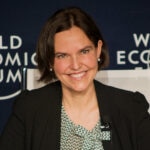Davos 2022: Projects linked to energy transition and other M&A trends
Luisa Gómez Bravo, Global Head of BBVA Corporate & Investment Banking, is in attendance at the World Economic Forum held in the Swiss city of Davos and was one of the speakers at a round table on the mergers and acquisitions market titled 'Will the M&A Boom Last?'. After a record year of M&A deals in 2021, the current economic scenario augurs a decline in this market, due to its high exposure to the international geopolitical context. Even so, mergers and acquisitions continue to offer great opportunities in infrastructure, ESG projects and investment in real assets.

BBVA Corporate & Investment Banking (CIB) was represented at the Davos Forum by Luisa Gómez Bravo, who was invited to a round table on the outlook for mergers and acquisitions. Titled “Will the M&A Boom Last?” and moderated by Andy Serwer, Editor-in-Chief at Yahoo Finance USA, the talk was also attended by Manvinder Singh Banga, a partner at Clayton, Dubilier & Rice, and Dr Peter Orszag, CEO of Financial Advisory at Lazard USA.
Luisa Gómez Bravo pointed out during her speech that, after the volume of M&A activity hit historic highs in 2021, doubling the average of the past 10 years, the figures for 2022 suggest a downward trend. Nevertheless, despite the context of geopolitical pressure and a tightening of monetary policy around the world, the numbers for the first quarter are still promising, standing at 25% above those for the same period last year. “We have to be careful about comparing our current state of play to exceptionally good years like 2021. Despite the ongoing uncertainties, the beginning of the year has been encouraging, and we will see attractive opportunities in the short term.”
The role of ESG in M&A
Another topic discussed by the panel was the finance that will be needed to fund today’s major market trends. In a scenario of far-reaching change within organizations, ESG strategies and energy transition projects have become critical. “There will be a sweeping transition in the relationship between corporations and the main sources of capital, such as investment and pension funds. The “partnership concept” will facilitate the transition and channel the necessary capital for its development,” said Luisa Gomez Bravo.

Upcoming trends in the industry
The panel members noted that, alongside the energy transition, we see trends such as technological innovation and its impact on corporations, a new entrepreneurial spirit that emerged in the post-Covid era, and challenges in the supply chain. “We think there will be exciting opportunities in supply chain projects, due in large part to companies that have weathered the pandemic and are now even stronger, and to the availability of liquidity in both the banking industry and among financial sponsors,” Gómez Bravo stated. Another major focus of investment for the coming months is expected to be infrastructure.
In Gómez Bravo’s view, the tough international context or “new world order” will strengthen the idea of “friend-shoring:” a search for business allies in terms of company location and the supply chain, where strategic autonomy will play a key role in future M&A flows.
The speakers agreed in their conclusion that despite the many current uncertainties there are clear opportunities for business growth and development, and M&A deals will play a leading role.
About Davos 2022
The 2022 Annual Meeting will embody the World Economic Forum's philosophy of collective, multi-stakeholder impact, providing a unique environment in which to reconnect, exchange insights, gain fresh perspectives, build communities and advance problem-solving initiatives. In a context of deepening global friction and fractures, the meeting will be the starting point of a new era of global responsibility and cooperation.
